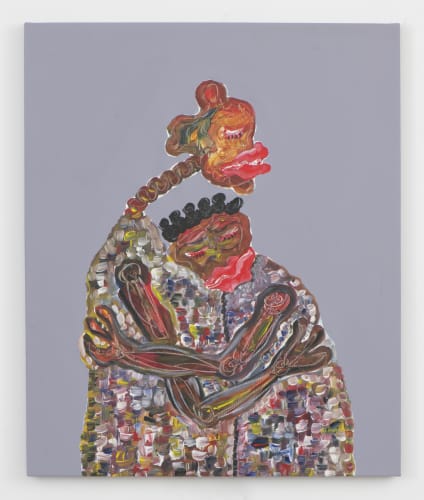The Malian painter’s first solo exhibition in New York muses on the desires and compulsions that guide us toward enlightenment — and occasionally get us into trouble.
In “Soif Lubrique” (2021), Malian painter Famakan Magassa portrays two lovers in a scene of sexual frustration. From opposite ends of an empty bed, a bald man lunges toward a gray-haired woman, who turns away with her hand raised. The bulky earth tones of Magassa’s nude subjects match an oversized shoe in the bottom corner, evoking the Muslim symbol of undesirability. The artist thus turns a scene of “lustful thirst” into an allegory of ridicule, set against a deep-blue background that creates the illusion of floating.
For Magassa, now based in Paris, vice is as central to life as water. His first exhibition in New York City muses on the theme of thirst, using Mali’s ongoing water crisis as a jumping off point to explore different forms of longing. Soifs (or, Thirsts) at Albertz Benda addresses complex human relationships and restrictive gender roles with a lightness that cuts through the tension. In a series of large-scale acrylic and collage paintings made in 2021, Magassa assumes the role of playful trickster, pointing to the desires and compulsions that guide us toward enlightenment — and occasionally get us into trouble.
For an emerging artist, Magassa already exhibits a mastery of theme. Even though all the works are unlabeled in the gallery, one can still surmise the allusions at play here, from seeking knowledge and familiar comforts to indulging in casual sex and drunken revelry. Three figures smoking and drinking at a table convey the thirst for inebriation, while other groups are shown floating around a stack of books (“Soif de Connaissance”) or lifting weights together. One tender scene details a lover approaching their partner’s house with a bouquet behind their back, and another portrays a solitary woman with her own bouquet on a park bench (“Soif de Solitude”).
Many of these works speak to Magassa’s cross-cultural experience in France and Mali, the latter of which is 95-percent Muslim. His dark-skinned, full-lipped subjects are shown wearing only one shoe or in the process of losing them, hinting at the stigma of disreputability associated with Shaitan. The presence of this motif correlates with acts of homoeroticism and sex work, yet Magassa absolves his subjects from condemnation. In the exercise scene, one figure is shown with a single red stiletto running out of the frame, and based on the context, one may assume she is training for self-preservation or survival.
Magassa’s irreverent humor often comes through without judgment, yet it occasionally falls flat. In “Soif de Pouvoir” (Thirst for Power), a police figure appears seated on a throne atop a nude body, feeding an apple core to the latter, who bends backward to accept it. The scene would be a compelling critique of power if not for the blue mask symbol on the cop’s hat; this creates dissonance between the food scraps offered by an authority figure, who also seems to be enforcing public health. While the artist may be merely hinting at the chaotic COVID-era debates around masking, the piece doesn’t really seem to bridge any divide, instead landing squarely on the side of power.
Yet Magassa is uninterested in overly moralizing. Much like the Kôrêdugaw — a secret society of Malian performance artists who preserve cultural knowledge — he points to the contradictions, absurdity, and spontaneity that make life so rich. Just as the Kôrêdugaw instill wisdom through levity, Magassa combines myth-making with a youthful humor, resulting in expressive scenes of joy and anguish — and often both at once.
Famakan Magassa: Soifs continues at Albertz Benda gallery (515 West 26th Street, Chelsea, Manhattan) through February 26, 2022.

